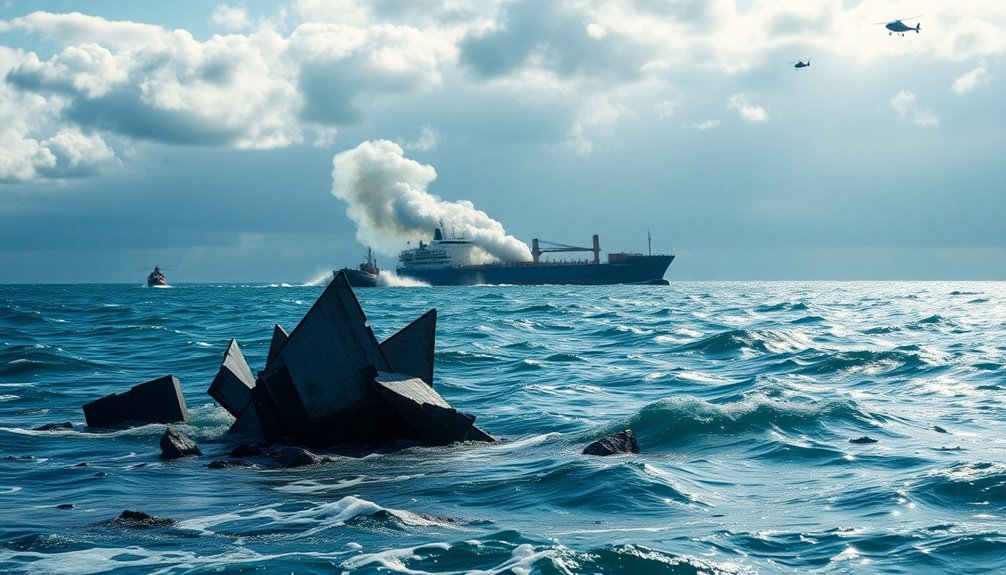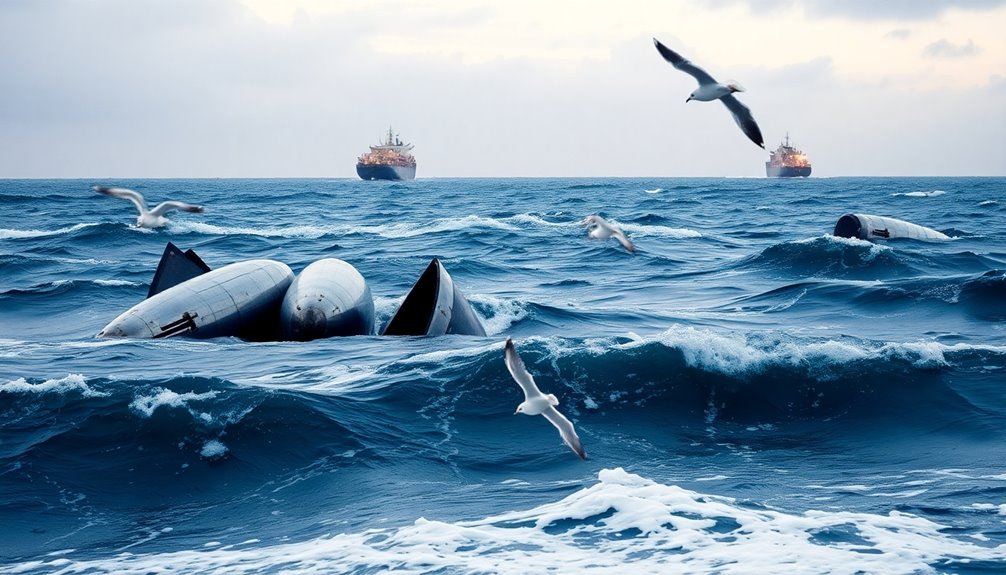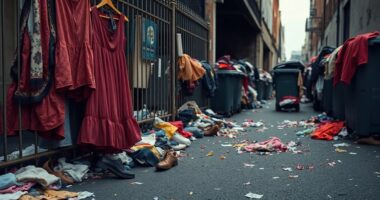The recent North Sea collision between the oil tanker Stena Immaculate and the cargo vessel MV Solong has stirred a heated blame game among the involved parties. Concerns arise over MV Solong's safety violations, including failed inspections and deficiencies earlier this year. The incident also caused a fuel leak, raising environmental issues. As investigations unfold, the implications for maritime operations and safety protocols become more crucial. You might find intriguing developments about the ongoing fallout and future changes.
Key Takeaways
- The collision involved the US-flagged oil tanker Stena Immaculate and the Portuguese cargo vessel MV Solong, raising safety concerns.
- MV Solong had previously failed critical safety inspections, highlighting operational integrity issues.
- The arrest of MV Solong's captain on gross negligence manslaughter charges complicates the legal ramifications.
- Environmental implications arise from fuel leakage into the North Sea, prompting scrutiny and potential cleanup measures.
- Ongoing investigations may lead to policy changes and discussions on improving maritime safety protocols and compliance.

A dramatic collision between two vessels in the Humber Estuary has sparked a massive rescue operation and raised serious safety concerns. On a Monday morning at around 9:48 AM, the US-flagged oil tanker Stena Immaculate collided with the Portuguese cargo vessel MV Solong. Stena Immaculate was transporting a staggering 35 million liters of US military jet fuel, while Solong was en route from Grangemouth to Rotterdam. The incident led to immediate lifeboat and helicopter deployments, with rescue efforts lasting over 12 hours.
As rescue teams worked tirelessly, the aftermath revealed troubling safety violations. The MV Solong had failed critical steering-related safety inspections earlier, with ten deficiencies noted just months prior. Even more alarming, two additional deficiencies were discovered in a recent inspection, raising suspicions about the vessel's operational integrity. Moreover, the captain of MV Solong has been arrested on suspicion of gross negligence manslaughter, which adds a layer of complexity to the unfolding investigation.
Human error could be a significant factor in the collision, compounded by poor visibility conditions, although investigations are ongoing.
The environmental implications of this collision weigh heavily on the minds of authorities. At least one cargo tank on Stena Immaculate ruptured, leading to fuel leakage into the North Sea, raising pollution concerns. Fortunately, jet fuel tends to biodegrade more easily due to its smaller hydrocarbon composition, but the potential ecological impact is still under scrutiny.
The Maritime and Coastguard Agency is currently assessing counter-pollution measures, with cleanup costs projected at around £15 million.
Legal ramifications are unfolding as well, with a criminal investigation focused on gross negligence manslaughter. The Russian captain of MV Solong has been arrested, and agencies like Humberside Police are diving into the details. The voyage data recorders may provide crucial insights into the events leading up to the crash.
As the dust settles, the collision has ignited a blame game, highlighting the dire need for stringent safety protocols at sea. Your awareness of these issues can help foster discussions on maritime safety and environmental protection.
Frequently Asked Questions
What Were the Environmental Impacts of the Tanker Collision?
The tanker collision had significant environmental impacts.
You'd see immediate threats to marine ecosystems, especially near sensitive habitats. Jet fuel spills can be toxic to local wildlife, including harbor porpoises and fish stocks.
Fire incidents burned off some fuel, but pollutants still pose risks.
Long-term, you might notice disruptions in food chains and potential contamination of water sources.
Ongoing ecological monitoring is essential to fully assess these impacts over time.
How Did the Collision Affect Local Shipping Routes?
You might think that a collision in the North Sea wouldn't impact shipping routes much, but it did.
As authorities assessed the incident, they adjusted shipping lanes to avoid the area, creating detours for vessels. This change increased travel times and costs for shipping companies.
Local ports also faced disruptions, affecting delivery schedules and regional trade.
The ripple effect on logistics showcases how one accident can significantly alter maritime operations.
What Safety Measures Are in Place for Tankers?
Tankers have several safety measures in place to ensure safe navigation.
You'll find advanced navigation systems like GPS and AIS that track vessels accurately. In busy areas, Vessel Traffic Services help manage traffic flow. Adhering to designated shipping lanes is crucial to prevent collisions.
Regular inspections ensure compliance with safety standards, while emergency communication systems are ready to handle any distress situations.
These protocols work together to enhance overall maritime safety.
Who Regulates Tanker Operations in the North Sea?
Think of the North Sea as a bustling highway for tankers, where various regulatory bodies ensure safety.
You've got the International Maritime Organization (IMO) setting global standards, while the European Union enforces strict regulations for operations.
National authorities within the coastal states also play their part.
The Bonn Agreement and regional maritime authorities work to protect the environment, ensuring that every tanker sails under watchful eyes to minimize risks and pollution.
What Role Do Insurance Companies Play in Maritime Accidents?
Insurance companies play a crucial role in maritime accidents by providing financial protection against losses.
They assess risks to determine coverage and premiums, ensuring you're adequately insured. When accidents occur, they handle claims by investigating incidents and determining liability, which impacts your compensation.
Additionally, insurance protects your assets and interests while helping you comply with legal requirements. This support is vital for maintaining financial stability amidst the complexities of maritime operations.
Conclusion
In the wake of the North Sea tanker collision, it's easy to point fingers, but blame won't fix the damages or restore trust. Instead, let's focus on accountability and proactive measures to prevent future incidents. While some may argue that assigning blame is necessary for justice, it often distracts from the real issue: safety. By working together, the shipping industry can learn from this tragedy and ensure safer waters for everyone involved.









